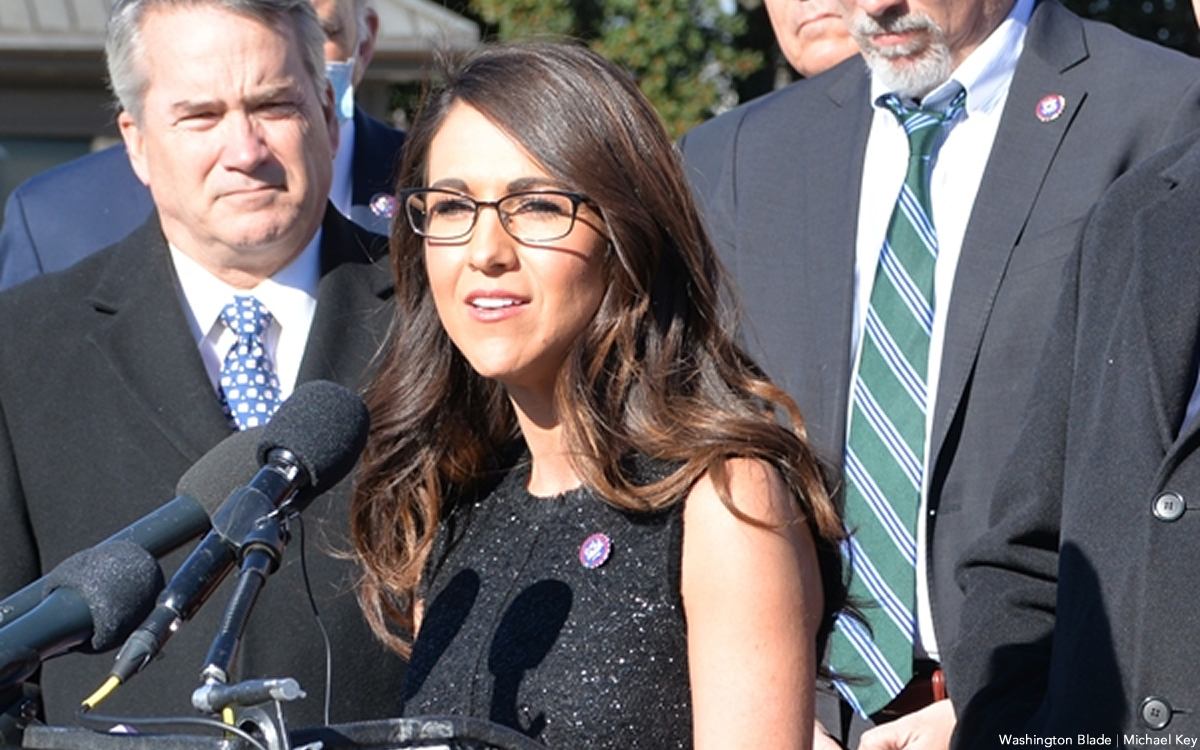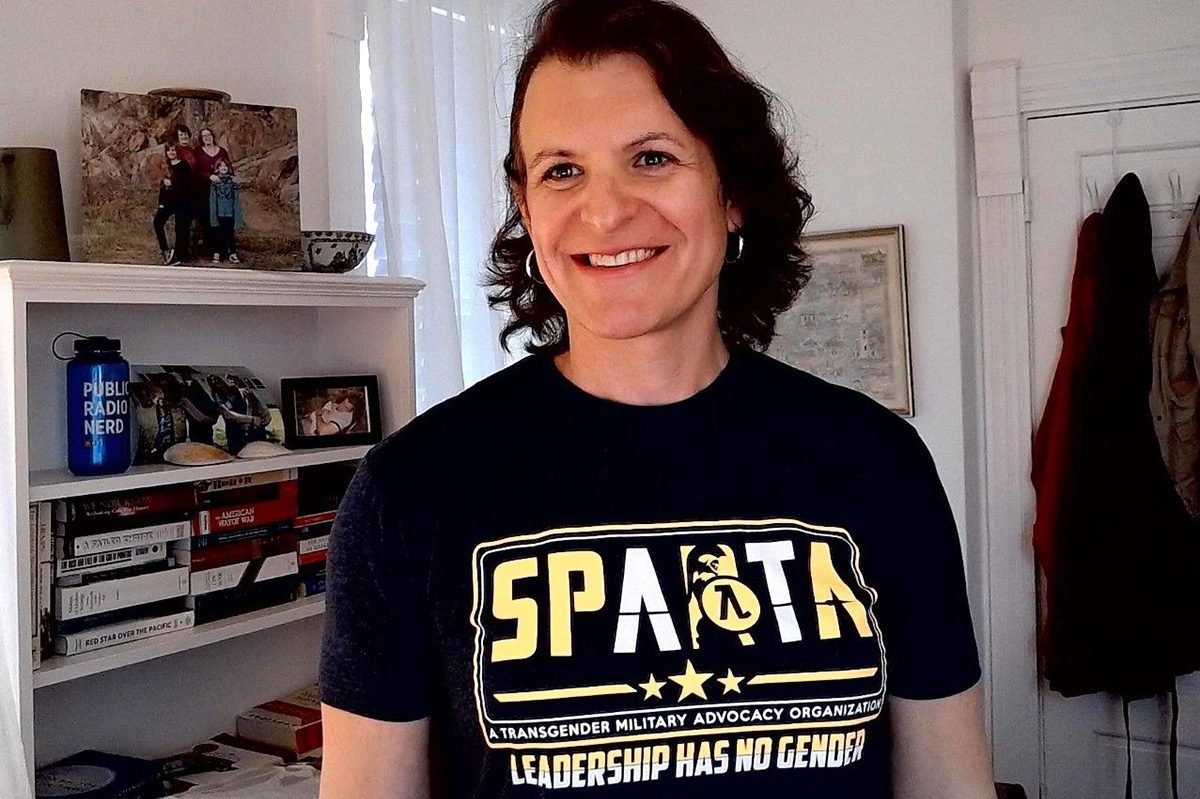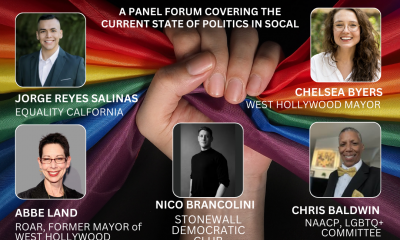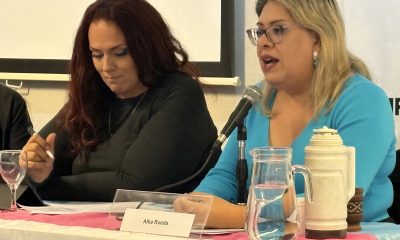Politics
Dems launch six-figure ad buy on Grindr highlighting Project 2025
‘Donald Trump’s MAGA GOP wants to drag us backwards’

The Democratic National Committee launched a six-figure ad campaign Wednesday that will run on Grindr, the location-based social networking and online dating app for gay and bisexual men and transgender users.
The campaign will highlight how former President Donald Trump, his vice presidential nominee U.S. Sen. JD Vance (R-Ohio), and their Republican allies would strip away rights and freedoms from LGBTQ Americans through their Project 2025 governing blueprint.
“LGBTQ+ Americans have fought tirelessly for equality — but Donald Trump’s MAGA GOP wants to drag us backwards and roll back our hard-earned freedoms,” DNC Rapid Response Director Alex Floyd said in a press release that was previewed by the Washington Blade.
“We cannot afford MAGA Republicans’ extreme, anti-equality Project 2025 agenda that will put our rights at risk and our lives on the line,” Floyd said. “Our votes are powerful, and it’s crucial that LGBTQ+ voters make their voices heard at the ballot box in this election to stop the Trump-Vance ticket’s dangerous Project 2025 blueprint.
He added, “This November, the American people — including LGBTQ+ voters — will choose Vice President Harris and Gov. Walz’s vision of equality for all over the ultra-MAGA GOP’s campaign of extremism and hate.”
Federal Government
USCIS announces it now only recognizes ‘two biological sexes’
Immigration agency announced it has implemented Trump executive order

U.S. Citizenship and Immigration Services on Wednesday announced it now only “recognizes two biological sexes, male and female.”
A press release notes this change to its policies is “consistent with” the “Defending Women from Gender Ideology Extremism and Restoring Biological Truth to the Federal Government” executive order that President Donald Trump signed shortly after he took office for the second time on Jan. 20.
“There are only two sexes — male and female,” said DHS spokesperson Tricia McLaughlin in a statement. “President Trump promised the American people a revolution of common sense, and that includes making sure that the policy of the U.S. government agrees with simple biological reality.”
“Proper management of our immigration system is a matter of national security, not a place to promote and coddle an ideology that permanently harms children and robs real women of their dignity, safety, and well-being,” she added.
The press release notes USCIS “considers a person’s sex as that which is generally evidenced on the birth certificate issued at or nearest to the time of birth.”
“If the birth certificate issued at or nearest to the time of birth indicates a sex other than male or female, USCIS will base the determination of sex on secondary evidence,” it reads.
The USCIS Policy Manuel defines “secondary evidence” as “evidence that may demonstrate a fact is more likely than not true, but the evidence does not derive from a primary, authoritative source.”
“Records maintained by religious or faith-based organizations showing that a person was divorced at a certain time are an example of secondary evidence of the divorce,” it says.
USCIS in its press release notes it “will not deny benefits solely because the benefit requestor did not properly indicate his or her sex.”
“This is a cruel and unnecessary policy that puts transgender, nonbinary, and intersex immigrants in danger,” said Immigration Equality Law and Policy Director Bridget Crawford on Wednesday. “The U.S. government is now forcing people to carry identity documents that do not reflect who they are, opening them up to increased discrimination, harassment, and violence. This policy does not just impact individuals — it affects their ability to travel, work, access healthcare, and live their lives authentically.”
“By denying trans people the right to self-select their gender, the government is making it harder for them to exist safely and with dignity,” added Crawford. “This is not about ‘common sense’—it is about erasing an entire community from the legal landscape. Transgender, nonbinary, and intersex people have always existed, and they deserve to have their identities fully recognized and respected. We will continue to fight for the rights of our clients and for the reversal of this discriminatory policy.”
Politics
City of Long Beach passes motion to become LGBTQ sanctuary city
The motion also officially recognizes Trans Day of Visibility on March 31st

Long Beach City Council passes motion to officially recognize March 31st as Transgender Day of Visibility and make Long Beach a sanctuary city for LGBTQ+ people, with all 8 councilmembers in favor.
At Tuesday’s City Council meeting, community members weighed in on the motion through public comment.
“The City of Long Beach is 1 of only 47 cities nationally that have gotten a perfect score on a Human Rights Campaign’s Municipal Equality Index,” said community member Anthony Brice at the public meeting. “It also received an extra 11 bonus points, so we are urging the city to please adopt this motion and uphold those standards.”
In March, Councilmember Megan Kerr, Councilmember Cindy Allen and Vice Mayor Roberto Uranga submitted a recommendation to Mayor Rex Richardson and the City Council to officially recognize March 31st as Transgender Day of Visibility in the City of Long Beach and recognize the City of Long Beach as a ‘Transgender Safe City.’
During the public comment section of the meeting, other community members also voiced their opinion and opposition to Elon Musk bringing SpaceX to Long Beach, citing his openly anti-trans and anti-LGBTQ agenda.
Janine Stallings, a trans community member, urged the city council to not just pass this “performative resolution,” but to also cancel all current contracts with SpaceX and any future plans for contracts.
According to the motion’s recommendation, “the current administration’s policies have raised concerns about the rights and protections of transgender, non-binary, and gender diverse individuals.”
The recommendation goes on to say that Long Beach has long been a hub for LGBTQ+ culture, activism and community, citing the Broadway Corridor as a cornerstone of the community for decades. The corridor is home to numerous LGBTQ+ businesses, gathering spaces and historic advocacy efforts, representing the city’s commitment to diversity and inclusion.
The recommendation – now an approved motion – called for Mayor Richardson to approve the recognition of March 31st as TDOV and make LBC a sanctuary city because it is essential to preserve the safe spaces that already exist.
“I am proud that our city remains an inclusive [city] and a safe place for everyone, especially our transgender community who, like many of you just talked about, face a heightened amount of criticism,” said Councilmember Allen. “It’s just been horrible – everything that’s been happening during this current administration.”
The city already has other policies in place regarding LGBTQ+ culture and identity such as, raising the Progress Pride Flag and the Transgender Pride Flag at City Hall, collecting sexual orientation and gender identity data to identify and address disparities within the community.
According to the recommendation, “under the current administration, it is more important than ever to unite and advocate for the protection of equal rights and legal protections for all.”
Congress
Republican lawmakers demand IOC ban transgender athletes from women’s events
2028 Summer Olympics to take place in Los Angeles

A group of Republican lawmakers have demanded the International Olympic Committee ban transgender athletes from women’s athletic competitions.
The lawmakers — U.S. Sens. Jim Risch (R-Idaho), Mike Crapo (R-Idaho), Jim Banks (R-Ind.), Marsha Blackburn (R-Tenn.), Steve Daines (R-Mont.), Lindsey Graham (R-S.C.), Josh Hawley (R-Mo.), Jim Justice (R-W.Va.), James Lankford (R-Okla.), Tim Sheehy (R-Mont.), and Tommy Tuberville (R-Ala.) and U.S. Reps. Burgess Owens (R-Utah), Lauren Boebert (R-Colo.), Vern Buchanan (R-Fla.), Tim Burchett (R-Tenn.), Dan Crenshaw (R-Texas), Brad Finstad (R-Minn.), Craig Goldman (R-Texas), Mark Green (R-Tenn.), Ashley Hinson (R-Iowa), Mike Kennedy (R-Utah), Nick LaLota (R-N.Y.), Blake Moore (R-Utah), Riley Moore (R-W.Va.), Austin Pfluger (R-Texas), John Rose (R-Tenn.), and Claudia Tenney (R-N.Y.) — made the demand in a letter they sent to IOC President Thomas Bach on Tuesday.
“In the United States, we honor our female Olympians. These athletes, and so many others, have inspired generations of young women around the world to compete and excel. Their legacy underscores the vital importance of fairness in women’s sports at every level of competition,” reads the letter. “Future Olympians are counting on the IOC to protect the opportunities of women and girls to contribute to this proud tradition.”
“To do so, the IOC must base eligibility for women’s athletic competitions on biological sex,” it adds. “Allowing biological males to compete in women’s categories undermines competitive opportunities, safety, and respect for female athletes.”
The IOC in 2021 adopted its “Framework on Fairness, Inclusion and Nondiscrimination on the Basis of Gender Identity and Sex Variations” that includes the following provisions:
• 3.1 Eligibility criteria should be established and implemented fairly and in a manner that does not systematically exclude athletes from competition based upon their gender identity, physical appearance and/or sex variations.
• 3.2 Provided they meet eligibility criteria that are consistent with principle 4 (“Fairness”, athletes should be allowed to compete in the category that best aligns with their self-determined gender identity.
• 3.3 Criteria to determine disproportionate competitive advantage may, at times, require testing of an athlete’s performance and physical capacity. However, no athlete should be subject to targeted testing because of, or aimed at determining, their sex, gender identity and/or sex variations.
The 2028 Summer Olympics will take place in Los Angeles.
President Donald Trump on Feb. 5 issued an executive order that bans trans women and girls from female sports teams in the U.S. The Human Rights Campaign and other advocacy groups criticized Democratic California Gov. Gavin Newsom last week after he said it is “deeply unfair” to allow trans athletes to compete in women’s sports.
The Guardian on Feb. 25 reported the State Department has ordered consular officials “to deny visas to transgender athletes attempting to come to the U.S. for sports competitions, and to issue permanent visa bans against those who are deemed to misrepresent their birth sex on visa applications.” A travel advisory for trans and nonbinary people who are planning to visit the U.S. that the German government issued last week specifically notes the Trump-Vance administration has banned the State Department from issuing passports with “X” gender markers.
The letter notes Trump’s Feb. 5 executive order, and indicates the signatories “stand united with Secretary of State Marco Rubio and President Trump in calling on the IOC to amend its standards and safeguard the opportunities of female athletes on the Olympic stage.”
“We urge you to reaffirm the IOC’s commitment to upholding the integrity of women’s Olympic competitions and ensure that only biological women and girls are allowed to compete in female sports categories,” reads the letter. “The Olympic Games should be a model for integrity in sports, and the next IOC president must firmly defend the rights of dedicated female athletes.”
The Los Angeles Blade has reached out to the IOC for comment.
National
Trump hails anti-trans policies in partisan speech before joint session of Congress
GLAAD: ‘a baseless and unhinged disinformation campaign’

President Donald Trump delivered a divisive and partisan address before a joint session of Congress on Tuesday that also included multiple references to his administration’s anti-transgender executive actions.
“We’ve ended the tyranny of so-called diversity, equity, and inclusion policies all across the entire federal government and indeed the private sector and our military,” Trump said, promising, “our country will be woke no longer.”
Later, he said “We have removed the poison of critical race theory from our public schools, and they signed an order making it the official policy of the United States government that there are only two genders, male and female.”
“I also signed an executive order to ban men from playing in women’s sports,” Trump said.
At that point, the president introduced one of his special guests, Payton McNabb—who, he said, was seriously injured three years ago when her girls’ volleyball game was “invaded by a male” who spiked the ball “so hard in Peyton’s face, causing traumatic brain injury.”
GLAAD, in a press release before Trump’s speech, noted that “McNabb has since been hired by opponents of trans people to use her injury to argue that all trans youth should be denied the chance to play sports as their authentic selves.”
She is “a paid spokesperson for an anti-transgender group that also advocates to ban health care and to force schools to dangerously out LGBTQ youth without their consent,” the group wrote.
Trump continued, “Take a look at what happened in the women’s boxing, weight lifting, track and field, swimming, or cycling, where a male recently finished a long distance race five hours and 14 minutes ahead of a woman for a new record by five hours.”
“It’s demeaning for women, and it’s very bad for our country. We’re not going to put up with it any longer.”
During this section of the speech, news cameras turned to Riley Gaines, a former NCAA swimmer turned anti-trans activist, who was a guest of Republican U.S. Rep. Mariannette Miller-Meeks (Iowa) and has worked with the same group as McNabb.
GLAAD wrote that Gaines “parlayed her fifth place finish into a career of testifying in states she does not live in to support full bans on transgender youth as young as kindergarten from playing sports.”
Later, when decrying government spending, Trump noted $8 million was used “to promote LGBTQI+ in the African nation of Lesotho, which nobody has ever heard of” and $8 million “for making mice transgender.”
About an hour into his speech, the president said, “My administration is also working to protect our children from toxic ideologies in our schools. A few years ago, January Littlejohn and her husband discovered that their daughter’s school had secretly socially transitioned their 13 year old little girl.”
“Teachers and administrators conspired to deceive January and her husband while encouraging their daughter to use a new name and pronouns,” he said. “‘They-them’ pronoun, actually, all without telling January, who is here tonight and is now a courageous advocate against this form of child abuse.”
GLAAD notes that “records show January Littlejohn of Tallahassee, Fla., worked with the school district to support her nonbinary child, before Littlejohn sued the district with lawyers from a national anti-LGBTQ+ group.”
According to GLAAD, the family’s complaint accused school of discussing “restrooms and name change requests with their child without their consent” but “a public records request showed that the family had ongoing communications with the school and gave approval to let their child and their teachers lead on appropriate school protocols.”
“The Trump White House is using the address to Congress to continue its baseless and unhinged disinformation campaign against transgender Americans,” GLAAD said. “The invited guests being deployed to smear transgender people are paid spokespeople for anti-LGBTQ groups that demand schools dangerously out LGBTQ students without their consent, who go against every major medical association supporting medically-necessary health care, and do nothing to promote women and girls in sports or protect everyone’s safety and wellbeing.”
Congress
Garcia vows not to be silenced amid U.S. Attorney’s inquiry into his criticism of Musk
Congressman received a letter from the U.S. attorney’s office in D.C.

U.S. Rep. Robert Garcia (D-Calif.) is pushing back after President Donald Trump’s interim U.S. attorney for D.C., Ed Martin, disclosed his office’s inquiry into whether the congressman’s remarks about Elon Musk earlier this month constituted a threat against a public official.
“This is completely ridiculous, to essentially threaten me with possible prosecution [and] investigations through the U.S. Department of Justice because I used a metaphor to criticize Elon Musk,” Garcia told The Bulwark’s Tim Miller during an interview on Feb. 20.
At issue is a Feb. 12 appearance on CNN during which, as Martin said in a letter to the congressman’s office, “When asked how Democrats can stop Elon Musk, you spoke clearly: ‘What the American public wants is for us to bring actual weapons to this bar fight. This is an actual fight for democracy.’”
He continued, “This sounds to some like a threat to Mr. Musk—an appointed representative of President Donald Trump who you call a ‘dick’—and government staff who work for him. Their concerns have led to this inquiry.”
Garcia’s comments came just after he participated in the first House subcommittee hearing on Musk’s DOGE, the Department of Government Efficiency, which was established by an executive order issued on the first day Trump took office.
In a statement to the Los Angeles Blade, House Democratic Leader Hakeem Jeffries (N.Y.) said “Rep. Robert Garcia is a thoughtful, hardworking, and law-abiding legislator who serves his constituents and the nation with distinction. House Democrats will not be intimidated by far-right extremists who are determined to weaponize the criminal justice system against Congress.”
Garcia serves on the powerful House Oversight Committee as well as in the Congressional Equality Caucus, as one of its 11 LGBTQ+ co-chairs. In November, he was elected the Democratic Caucus Leadership Representative.
“I’ve talked to a lot of folks, members of the House and others, who have been very supportive.” he said on Feb. 20. “I said, ‘Look, we can’t allow this singling out of me. It’s not really about me, right? This is about silencing critics and critics in Congress.’”
Later in the interview, he added “we’re talking to the appropriate folks, and of course, talking to folks in the Democratic leadership” who understand the broader stakes in terms of “our job” as House Democrats to “be the loyal opposition.”
U.S. Rep. Gerald Connolly (Va.), the Oversight Committee’s top Democrat, also issued a statement condemning Martin’s letter:
“This is a shameful attempt to silence and stifle congressional oversight. Mr. Martin—an organizer, financier, and legal representative for the January 6th insurrection—is weaponizing the Justice Department to carry out the president’s retribution tour.
“This ‘Operation Whirlwind’ is a smokescreen meant to distract from the true intentions of the Trump administration: Silencing criticism and snuffing out any attempt to exercise oversight of their misdeeds and perversion of the law. I can assure you that Congressman Garcia and our fellow Oversight Democrats will not be deterred by these threats, and we will continue to fight to safeguard our democracy and protect the rights of the American people we serve.”
Martin on Feb. 19 announced “Operation Whirlwind,” a new initiative to prosecute threats against public officials at all levels of government, which some critics and legal experts believe is primarily intended as a means of silencing criticism.
In addition to Garcia, Martin has sent letters to the Senate’s Democratic Leader Chuck Schumer (N.Y.) on Jan. 21, Feb. 3, and Feb. 11, indicating plans to review remarks he made in 2020 to see if they constituted unlawful threats against two of Trump’s U.S. Supreme Court nominees, Brett Kavanaugh and Neil Gorsuch.
“I want to tell you, Gorsuch,” Schumer said, “I want to tell you, Kavanaugh—you have released the whirlwind and you will pay the price. You won’t know what hit you if you go forward with these awful decisions.”
The top Senate Democrat was speaking during a rally about the conservative jurists’ potential revocation of decades-old constitutional protections for abortion, which they ultimately did in 2022 with their 5-4 decision in Dobbs v. Jackson Women’s Health Organization.
As detailed by aide to the senator in his response to Martin, “on March 5, 2020, the day after the comments referenced in your letter, Senator Schumer made the following remarks” from the Senate floor:
“Now, I should not have used the words I used yesterday. They didn’t come out the way I intended to. My point was that there would be political consequences—political consequences—for President Trump and Senate Republicans if the Supreme Court, with the newly confirmed Justices, stripped away a woman’s right to choose.
“Of course, I didn’t intend to suggest anything other than political and public opinion consequences for the Supreme Court, and it is a gross distortion to imply otherwise. I am from Brooklyn. We speak in strong language.
“I shouldn’t have used the words I did, but in no way was I making a threat. I never—never—would do such a thing. Leader McConnell knows that, and Republicans who are busy manufacturing outrage over these comments know that too.”
The aide concluded, “As Senator Schumer’s statement on the Senate floor confirmed, the comments were not a threat to physically harm any person. I hope that this clarifying information is helpful.”
Shortly after Trump’s appointment of Martin, the conservative lawyer and activist dismissed pending cases against rioters who sacked the Capitol building on Jan. 6, 2021, fired the prosecutors who were involved, and began investigations into those who brought obstruction charges that were ultimately invalidated by a U.S. Supreme Court decision in June.
Barbara McQuade, a former federal prosecutor who teaches law at the University of Michigan and serves as a legal analyst for NBC News and MSNBC, told the Washington Post she had “never seen anything like these letters from a U.S. attorney,” who would typically assign agents to lead such a probe while abiding the Justice Department’s policy of not confirming or denying the existence of any investigation.
“It seems like a fair inference that these letters are designed more to chill free speech than to seek clarification, as they purport to do,” McQuade added.
Garcia agreed, telling Miller that the effort “could have a chilling effect on other folks that actually want to come out and criticize and oppose” Trump, Musk, the administration, or their allies.
Looking ahead, Martin has “given me, by the way, till Tuesday to respond to this letter,” Garcia noted. When asked about what he planned to do, the congressman said “we’re having some conversations about that” but “what we’re not going to do is stay silent.”
“The lesson here is not to retreat,” he said. “The lesson here is to push harder and continue to let people know they are literally trying to limit free speech.”
Discussing his remarks about Musk during an appearance on CNN on Feb. 20, Garcia said “what’s really critical at this moment, I think, for all of us to understand, is that we should be allowed to speak freely, and we certainly should be allowed to use figures of speech, and anyone that watches that can see that as a figure of speech or a metaphor in the way we’re describing this fight.”
The congressman added, “And it is a fight. This is a fight for democracy.”
National
Federal workers, trans service members cope with Trump attacks
‘We could very easily be entering a Lavender Scare 2.0’

Since President Trump signed a series of executive orders rolling back federal worker protections, advocacy groups are ringing alarm bells signaling this could disproportionately impact more than 300,000 LGBTQ federal workers.
Trump has so far signed 65 executive orders, most of which attempt to shrink the size of the federal government and restructure how it works to better suit his interests. Of those 65 executive orders passed, at least six directly target LGBTQ people, one outright bans transgender people from serving in the military, and another ends all government efforts at promoting diversity, equity, and inclusion (DEI).
A study conducted in January by the Williams Institute, a research center that focuses on sexual orientation and gender identity law and public policy, showed that “one in ten LGBTQ adults are employed by the public sector,” with higher numbers of LGBTQ people working in federal government bureaus, the USPS, and as government contractors. This means that Trump’s orders could be particularly dangerous for LGBTQ Americans, potentially displacing hundreds of thousands of queer federal workers.
The Blade spoke with an LGBTQ executive branch employee who works directly with one of the resource groups targeted by the Trump administration to understand how these orders are being implemented internally. The source, fearing retaliation, requested anonymity.
“We had established lots of different things that were positive for LGBTQI+ employees to make sure that our identities were respected,” the source said. “What some folks may see as a simple thing like the allowance for pronouns in email signatures and the use of inclusive language, all those kinds of things are kind of in limbo right now. It’s fully expected to be said [by the Trump administration] that these things can’t be utilized anymore.”
The source noted that the public often misunderstands the role of these resource groups, making it harder to justify the need for such positions. A common misconception is that groups promoting DEI exist solely to hire minorities. Although part of their mission involves reaching historically underrepresented communities, their work extends far beyond recruitment, playing a crucial role in fostering inclusive workplace cultures and supporting employees.
“It’s just about creating that level playing field environment to make sure that you are doing the best for your organization to attract the best talent, and then the knowledge that it’s not just any one demographic that is best suited for a certain role,” they said. “Let me be very clear: It’s not about quotas, it’s not about checking boxes. It’s not about hiring one person on anything other than qualification over another. It’s about making sure that we’re looking at places where we may be missing opportunities for not just qualified candidates, but the best and brightest. And sometimes that means adjusting your recruitment style.”
This ongoing attack on DEI, as well as other efforts to promote inclusivity and fairness within the government by the twice-impeached president is a borrowed tactic from another infamous Republican who weaponized demagoguery to consolidate power — Sen. Joseph McCarthy.
“We could very easily be entering a Lavender Scare 2.0,” the source continued. “I mean, when you’re asking employees to rat on each other, basically, for anybody who might be involved in anything surrounding this work, it’s not unknown that a majority of folks who do diversity, equity, and inclusion work are members of minority, marginalized communities. It just painted a big target on the back of all those people.”
When asked to speculate on what they think this could mean for the roughly three million federal workers, the source said it could lead to a chilling effect where LGBTQ employees either face direct removal or feel compelled to leave due to a hostile work environment.
“I see an exodus coming — whether it is forced or voluntary,” said the source. “I don’t see with all the progress that’s been made over the last two decades people willing to stay working for an organization where they don’t feel like they’re safe. If you feel like you don’t have the psychological safety to do your job, and you’re worried about whether you’re gonna get fired, it kind of kills your psychological availability to do your job. People are not engaged.”
Colonel Bree Fram, the highest-ranking out transgender officer in the Department of Defense, who spoke to the Blade in her personal capacity and does not speak on behalf of the U.S. government or military, agreed with the source’s thoughts on inclusive spaces being critical for the success of government work and safety.
“Any policy that excludes a class of individuals is inherently damaging to national security, because if those individuals can meet the standards of the service, if they can accomplish the mission that they’ve been given, they are participating in a way that makes us stronger,” Fram said. “We create better solutions from a diverse set of perspectives that allows us to accomplish the mission in ways that support national security objectives. So if there is a transgender service member out there excluded merely for who they are, rather than their ability to complete their mission it’s an issue for our national security today and far into the future, because we have thousands of transgender service members actively accomplishing the mission today. They are doing so in a way that meets, or, in most cases, exceeds the standards, because they are highly capable, competent warriors that have learned their skill set and mastered their craft over decades, they are crushing it on behalf of the United States and in upholding their oath to the Constitution.”
The executive branch source echoed that sentiment. Both sources agree that the removal of these policies has the real potential to harm the government’s ability to function as a resource for its people.
“It takes a special type of person to work for the government,” the source said. “You’re not going to get rich. You’re not going to make as much money, generally. In the private sector you would, especially for folks who work in some of these specialized areas. Why would you want to work somewhere that you’re going to go nowhere, and no matter how hard you work, you’re not going to get anything?”
Not only do government employees feel they can’t perform at a professional level with these executive orders, some have expressed that they fear for the personal lives of LGBTQ staff members now too.
“People are concerned,” Fram said. “People are worried about what will happen to people that they work with. When any leader sees someone in their organization having a difficult time or having something outside of what they need to focus on to accomplish their duties, it is our responsibility as a leader to help that person through those issues. That is what leaders within the military, I believe, are seeing right now. They see members of their military family hurting and concerned about what their future may be. As a leader, we want to take care of people so that they can take care of the mission and having to spend resources to take care of people when they are hurt is very important, but it is also time consuming, and takes us away from things that we do need to be focused on.”
To find “things that we need to focus on,” is easier said than done. Fram said that for LGBTQ members of the federal workforce, specifically trans members of the military, it’s not only the fight against unjust actions and rhetoric from Trump, but also internally within the service members themselves.
“The challenge all of us face is, how do we determine and know our own self worth?” Fram asked. “Do we let an outside source define who we are? For transgender people, that is a deep strength of ours. … We know what to focus on. We know that we are who we are. We exist, and it is our deep duty and responsibility to care about future generations and protecting and defending our freedoms.”
When asked how to support people in these groups as workplace inclusion shifts away from being a standard part of their professional environment, Fram had a simple answer: listen to those who are being excluded.
“I believe the most powerful thing any of us have is our story,” Fram said. “Our story of courage and commitment and development and capability, how we serve, how we accomplish the missions that we’ve been given. So the best thing people can possibly do right now is share our stories, connect with our humanity, understand who we are in reality, not the rhetoric being used to demonize us. Trans people are a small portion of the population, so it’s easy to hate who you don’t know or don’t understand or have never met. So meet a trans person, read their story, share their story, and your perceptions may change.”
The Blade reached out to the Trump-Vance administration for comment but did not receive a response.
In the long run, Fram explained, vilifying and marginalizing people for who they are ultimately harms the cohesive team dynamics essential to achieving a common goal — whether on the battlefield or in the boardroom.
“What we’ve learned from countless examples through history, for trans people, for lesbians, gays, and bisexuals, and for other groups, anyone really who had to hide a piece of their identity in order to serve,” Fram said. “You cannot be as effective as you can be when you are spending energy hiding who you are. That’s a concern I have as more people pull back and have to hide a portion of who they are. We lose some of that cohesion within teams, because that energy that you have to spend on protecting yourself could be dedicated to building the cohesive relationships around you that foster teams that become incredibly successful. That’s one of the things where people being authentic serves the purposes of the military. It builds those strong bonds that allow teams to function effectively and accomplish their wartime mission.”
National
Trump’s trans erasure arrives at National Park Service
Fate of major 2016 LGBTQ Theme Study unclear

President Trump’s efforts at erasing trans identity intensified this week as employees at the National Park Service were instructed to remove the “T” and “Q” from “LGBTQ” from all internal and external communications.
The change was first noticed on the website of the Stonewall National Monument; trans people of color were integral to the events at Stonewall, which is widely viewed as the kickoff of the modern LGBTQ rights movement. The Stonewall National Monument is the first U.S. national monument dedicated to LGBTQ rights and history.
Reaction to that move was swift. New York City Council member Erik Bottcher wrote, “The Trump administration has erased transgender people from the Stonewall National Monument website. We will not allow them to erase the very existence of our siblings. We are one community!!”
But what most didn’t realize is that the removal of the “T” and “Q” (for transgender and queer) extends to all National Park Service and Interior Department communications, raising concerns that the move could jeopardize future LGBTQ monuments and project work.
The Blade reached out to the National Park Service for comment on the trans erasure and received a curt response that the agency is implementing Trump’s executive order “Defending Women from Gender Ideology Extremism and Restoring Biological Truth to the Federal Government” as well as agency directives to end all DEI initiatives.
The question being debated internally now, according to a knowledgable source, is what to do with a massive LGBTQ Theme Study, which as of Feb. 14 was still available on the NPS website. In 2014, the Gill Foundation recognized an omission of historic LGBTQ sites in the nation’s records, and the organization made a grant to the National Park Service to commission a first-of-its-kind LGBTQ Theme Study, which was published in 2016. It was a landmark project that represented major progress for the LGBTQ community in having our contributions included in the broader American story, something that is becoming increasingly difficult given efforts like “Don’t Say Gay” laws that ban the teaching of LGBTQ topics in schools.
A source told the Blade that National Park Service communications staff suggested that removing chapters of the 2016 Theme Study that pertain to transgender people might placate anti-trans political appointees. But one employee pushed back on that, suggesting instead that the entire Theme Study be removed. Editing the document to remove one community’s contributions and perspective violates the academic intent of the project, according to the source. A final decision on how to proceed is expected soon.
Meanwhile, a protest is planned for Friday, Feb. 14 at noon at Christopher Park in New York City (7th Ave. S. and Christopher Street). The protest is being planned by staff at the Stonewall Inn.
“The Stonewall Inn and The Stonewall Inn Gives Back Initiative are outraged and appalled by the recent removal of the word ‘transgender’ from the Stonewall National Monument page on the National Park Service website,” the groups said in a statement. “Let us be clear: Stonewall is transgender history. Marsha P. Johnson, Sylvia Rivera, and countless other trans and gender-nonconforming individuals fought bravely, and often at great personal risk, to push back against oppressive systems. Their courage, sacrifice, and leadership were central to the resistance we now celebrate as the foundation of the modern LGBTQ+ rights movement.”
Federal Government
Education Department moves to end support for trans students
Mental health services among programs that are in jeopardy

An email sent to employees at the U.S. Department of Education on Friday explains that “programs, contracts, policies, outward-facing media, regulations, and internal practices” will be reviewed and cut in cases where they “fail to affirm the reality of biological sex.”
The move, which is of a piece with President Donald Trump’s executive orders restricting transgender rights, jeopardizes the future of initiatives at the agency like mental health services and support for students experiencing homelessness.
Along with external-facing work at the agency, the directive targets employee programs such as those administered by LGBTQ+ resource groups, in keeping with the Trump-Vance administration’s rollback of diversity, equity, and inclusion within the federal government.
In recent weeks, federal agencies had begun changing their documents, policies, and websites for purposes of compliance with the new administration’s first executive action targeting the trans community, “Defending Women From Gender Ideology Extremism and Restoring Biological Truth to the Federal Government.”
For instance, the Education Department had removed a webpage offering tips for schools to better support homeless LGBTQ+ youth, noted ProPublica, which broke the news of the “sweeping” changes announced in the email to DOE staff.
According to the news service, the directive further explains the administration’s position that “The deliberate subjugation of women and girls by means of gender ideology — whether in intimate spaces, weaponized language, or American classrooms — negated the civil rights of biological females and fostered distrust of our federal institutions.”
A U.S. Senate committee hearing will be held Thursday for Linda McMahon, Trump’s nominee for education secretary, who has been criticized by LGBTQ+ advocacy groups. GLAAD, for instance, notes that she helped to launch and currently chairs the board of a conservative think tank that “has campaigned against policies that support transgender rights in education.”
NBC News reported on Tuesday that Trump planned to issue an executive order this week to abolish the Education Department altogether.
While the president and his conservative allies in and outside the administration have repeatedly expressed plans to disband the agency, doing so would require approval from Congress.
Politics
Trump bars trans women and girls from sports
The administration reversed course on the Biden-Harris policy on Title IX

President Donald Trump on Wednesday issued another executive order taking aim at the transgender community, this time focusing on eligibility for sports participation.
In a signing ceremony for “Keeping Men Out of Women’s Sports” in the East Room of the White House, the president proclaimed “With this executive order, the war on women’s sports is over.”
Despite the insistence by Trump and Republicans that trans women and girls have a biological advantage in sports over cisgender women and girls, the research has been inconclusive, at best.
A study in the peer reviewed Sports Medicine journal found “no direct or consistent research” pointing to this conclusion. A different review in 2023 found that post-pubertal differences are “reduced, if not erased, over time by gender affirming hormone therapy.”
Other critics of efforts to exclude trans student athletes have pointed to the small number of people who are impacted. Charlie Baker, president of the National Collegiate Athletic Association, testified last year that fewer than 10 of the NCAA’s 522,000+ student athletes identify as trans.
The Trump-Vance administration has reversed course from the Biden-Harris administration’s policy on Title IX rules barring sex-based discrimination.
“If you’re going to have women’s sports, if you’re going to provide opportunities for women, then they have to be equally safe, equally fair, and equally private opportunities, and so that means that you’re going to preserve women’s sports for women,” a White House official said prior to the issuance of the order.
Former President Joe Biden’s Title IX rules, which went into effect last year, clarified that pursuant to the U.S. Supreme Court’s ruling in Bostock v. Clayton County (2020), sex-based discrimination includes that which is based on the victim’s sexual orientation or gender identity.
The White House official indicated that the administration will consider additional guidance, regulations, and interpretations of Title IX, as well as exploring options to handle noncompliance by threatening federal funding for schools and education programs.
White House Press Secretary Karoline Leavitt told reporters that Trump “does expect the Olympic Committee and the NCAA to no longer allow men to compete in women’s sports.”
One of the first legislative moves by the new Congress last month was House Republicans’ passage of the “Protection of Women and Girls in Sports Act,” which would ban trans women and girls from participating in competitive athletics.
The bill is now before the U.S. Senate, where Republicans have a three-seat majority but would need 60 votes to overcome the filibuster.
Politics
Transgender people removed from State Department travel page
Previous administration used LGBTQI+ acronym

The State Department has eliminated references to transgender travelers from its travel advisories.
The International Travel tab that the State Department’s Bureau of Consular Affairs maintains has a section for “LGB Travelers.”
“LGB travelers can face special challenges abroad,” reads the introduction. “Laws and attitudes in some countries may affect safety and ease of travel. Many countries do not recognize same-sex marriage. Many countries also only recognize the male and female sex markers in passports and do not have IT systems at ports of entry that can accept other sex markers. About 70 countries still consider consensual same-sex relations a crime. In some of these countries, individuals who engage in same-sex sexual relations may face severe punishment.”
Steven Romo of NBC News and other reporters have noted the same page before President Donald Trump took office used the LGBTQI+ acronym to describe the community. State Department officials with whom the Los Angeles Blade spoke during the Biden-Harris administration routinely used the LGBTQI+ acronym.
The State Department website is replacing LGBTQI+ with simply LGB
Last month vs today pic.twitter.com/U4U0DHMasR
— Steven Romo (@stevenromo) January 31, 2025
Trump since he took office on Jan. 20 has issued a number of executive orders that specifically target trans people.
One directive bans the State Department from issuing passports with “X” gender markers, reversing a policy that took effect in 2022.
Secretary of State Marco Rubio earlier this week issued a waiver that allows the President’s Emergency Plan for AIDS Relief and other “life-saving humanitarian assistance” programs to continue to operate during the freeze on nearly all U.S. foreign aid spending. The waiver does not apply to “activities that involve abortions, family planning conferences” and “gender or DEl ideology programs, transgender surgeries, or other non-life saving assistance.”
-

 Features4 days ago
Features4 days agoLos Angeles Blade kicks off Free Community Event Series with an informative political panel of government and advocacy group leaders
-

 a&e features23 hours ago
a&e features23 hours agoMusical Mondays, a mainstay in WeHo nightlife, celebrates 16 years
-

 Features5 days ago
Features5 days agoFinding love in queer Los Angeles with matchmaker Daniel Cooley
-

 Arts & Entertainment5 days ago
Arts & Entertainment5 days agoLA Opera brings back Pride Night with a production of ‘Ainadamar’
-

 Noticias en Español4 days ago
Noticias en Español4 days agoINDIGNACIÓN: ¡El transfeminicidio de Sara Millerey en Colombia nos cuestiona como sociedad!
-

 Argentina5 days ago
Argentina5 days agoArgentina’s transgender community confronts ‘chaotic, desperate’ situation
-

 Myanmar14 hours ago
Myanmar14 hours agoLGBTQ+ advocacy group joins Myanmar earthquake relief effort
-

 a&e features16 hours ago
a&e features16 hours agoPeppermint thrives in the spotlight
-

 Arts & Entertainment12 hours ago
Arts & Entertainment12 hours ago‘Bring it to Brunch’ returns to West Hollywood




